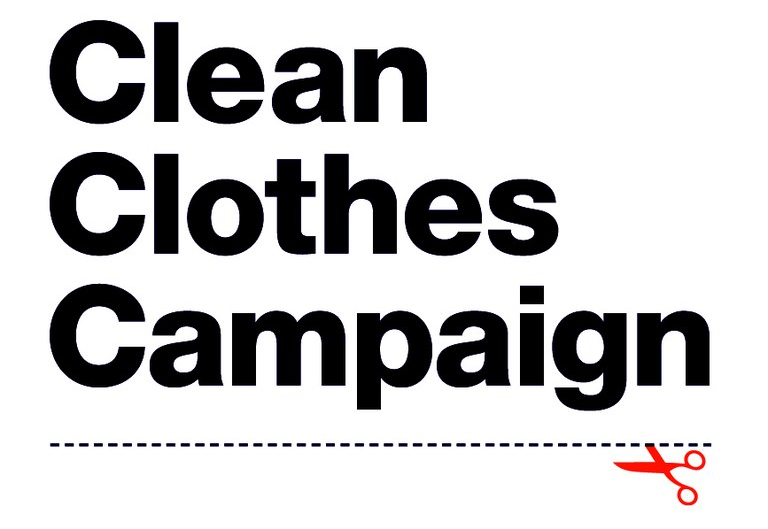Search results
13 results
Sort by:
BLOG - London Fashion Week’s #PositiveFashion must include #GarmentWorkersRights
Sustainability has become a buzz word in fashion, so much so that London Fashion Week 2019 is dedicating a whole exhibition area to #PositiveFashion, a space in which to “explore the most compelling stories around sustainability.”
Clean Clothes Campaign pushes for binding agreements for a living wage
On the second day of the Living Wage Now Forum in Brussels, prior to the delivery of 150.000 signatures from Clean Clothes Campaign, Clean Clothes Campiagn pushes for binding agreements and legislation to ensure accountibility of brands in the garment sector. The Clean Clothes Campaign presented the signatures to international clothing brands and European Commission representatives during the Living Wage Now Forum.
100 civil society organisations call for EU law to address environmental and human rights abuses in corporate supply chains
Ahead of the Finnish EU Presidency’s business and human rights event today, over 100 civil society organisations and trade unions have now signed a letter calling on the European Union to develop effective legislation, that would oblige companies and financial institutions to address the human rights and environmental impact of their global operations and supply chains.
Civil call for human rights and environmental due diligence legislation
Over 80 NGOs and trade unions have called on the European Commission to bring forth this term new corporate accountability legislation requiring companies to respect human rights and the environment in their global value chains and operations. The signatories urge that victims of corporate violations should have their access to judicial remedy enhanced by the new legislation.
German Supply Chain law: step in the right direction, yet still failing workers affected by violations
We welcome the introduction of human rights due diligence as an obligation through the new supply chain law that was passed today in Germany. However, the law also has some serious shortcomings. We are calling for the upcoming EU level legislation to introduce comprehensive due diligence obligations and ensure access to justice for the victims, including through civil procedure.
European Union one step closer to corporate accountability but with a long way to go
Clean Clothes Campaign cautiously welcomes the long awaited rules on corporate sustainable due diligence proposed by the European Commission. Whereas the proposal falls short of our recommendations, the introduction of a binding obligation on companies to carry out human rights and environmental due diligence is a major step toward corporate accountability. We call upon the European Parliament and the Council of the European Union as co-legislators to ensure that the legislation ultimately brings yet stronger protections for the workers and other rights holders.
Compromise EU law will start holding companies accountable, 11 years after Rana Plaza collapse
In a landmark vote, the European Parliament approved the Corporate Sustainability Due Diligence Directive (CSDDD), a law representing a first step towards global value chains free from human rights and labour abuses as well as environmental harm. The text the Parliament green-lighted will cover only a very small minority of EU companies. The law also provides different enforcement options for Member States and avenues to remedy and justice for victims. However, the Directive still lacks rules removing obstacles victims face when they try to access justice in European courts. The final text does not include crucial International Labour Organisation’s (ILO) Conventions on Occupational Safety and Health, leaving workers in hazardous and potentially lethal conditions. Clean Clothes Campaign will continue to advocate for ambitious rules during the transposition of the law by Member States.
Human rights and labour rights organisations express concern about planned changes to Sri Lankan Labour law
Amnesty International, Clean Clothes Campaign, and Human Rights urgently call on the Sri Lankan Government to halt the current proposals for a new Labour Law and to ensure that reforms to the labour laws are only taken after due consultation with workers and their representatives. These organisations express serious concerns the proposed reforms which, as they stand, would weaken the rights and protection of workers by removing international minimum standards and rights. The concerns expressed in this letter reflect and follow repeatedly expressed protests and alarm by a broad coalition of unions and civil society organisations in Sri Lanka.
Corporate Sustainability Due Diligence: Member States chose to protect corporate profits and fail workers and human rights
Today the Council of the European Union struck a blow to corporate accountability and workers’ rights in the garment and footwear industry by failing to endorse a deal it had made with the European Parliament and the Commission on landmark legislation to protect human rights and the environment from corporate abuse.
German Supply Chain law: step in the right direction, yet still failing victims
Response of a coalition of nine NGOs working closely on the EU’s upcoming proposal Sustainable Corporate Governance Directive, to the German supply chain law adopted on 11 June 2021.
Civil call for human rights and environmental due diligence legislation
In October 2019, over 80 NGOs and trade unions called on the European Commission to bring forth this term new corporate accountability legislation requiring companies to respect human rights and the environment in their global value chains and operations. By the end of November 2019 more than 100 organisations had signed the call.
Open Letter Sri Lanka AI CCC HRW
Amnesty International, Clean Clothes Campaign and Human Rights Watch express concern about the plans for changes to the labour law in Sri Lanka and the lack of transparency and process.
Principal Elements of an EU mandatory Human Rights Due Diligence legislation
All around the world, businesses are responsible for human rights abuses and environmental harm, as underscored by the recent COVID-19 crisis. Businesses must not be allowed to close their eyes to the impact of their business decisions on other actors in the chain. Voluntary measures have proved to be vastly insufficient, as recognised by the recent European Commission study on due diligence requirements through the supply chain.
